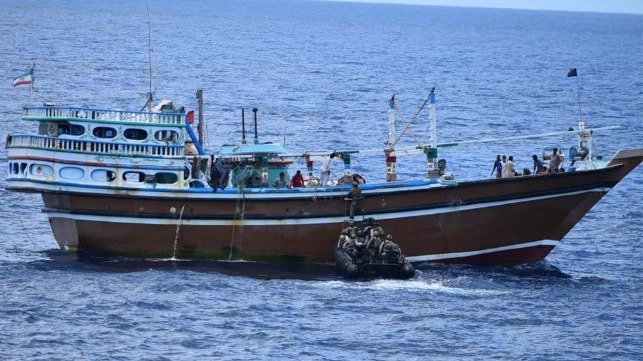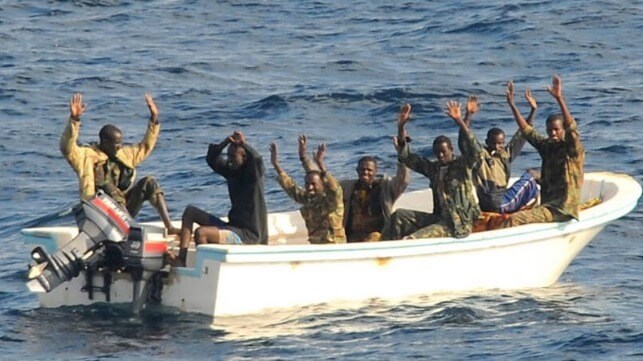“Anyone who can read history with both hemispheres of the brain knows that a world comes to an end every instant–the waves of time leave washed up behind themselves only dry memories of a closed & petrified past.”
-Hakim Bey
“What others see as chaos, a pirate sees as the perfect storm for growth and transformation.”
-Edward Teach aka Blackbeard
In case you haven’t noticed, things have been getting pretty lively on the high seas lately and all available indications seem to point to them getting much livelier long before slack tide sets in. After months of Houthi rebel attacks on international shipping linked to Israel and its western backers in the Red Sea, Iran has decided to get in on the action to avenge their comrades killed by an IDF airstrike on their Damascus consulate.
While the headlines may focus on Iran’s largely symbolic drone swarm into the bug zapper of the Iron Dome, the Islamic Republic kicked off this theatrical display of vengeance by launching a daylight raid on a Portuguese-flagged container vessel called the MSC Aries 50 miles off the coast of the UAE near the Strait of Hormuz. The ship, owned by Zionist billionaire and former Israeli Air Force intelligence officer, Eyal Ofer, was boarded by commandos of the Islamic Revolutionary Guard Corp in a well-choreographed and conveniently filmed raid that involved the heavily armed men repelling on the deck from an idling chopper.
A visually stunning spectacle of propaganda of the deed uncannily similar to the Houthi rebel assault on the Galaxy Leader in November which also began in an MI-17 and ended with the nautical toy of another Israeli oligarch named Abraham Ungur being absconded to Hodeida where it has been turned into a sort of revolutionary chic tourist attraction.
The western intelligentsia will point to these similarities and announce them to be proof that those dastardly Houthi rebels are little more than IRGC agents doing the bidding of the Mullahs. I would actually argue the opposite. It is a well-known if poorly reported fact that in spite of the largely rhetorical support from the Ayatollah, the Houthi rebels have a long and illustrious history of going rogue and disobeying what little advice they receive from Tehran. This included calls to stand down on overthrowing a government in Sanaa that Iran was still attempting to make inroads with.
The Houthis launched their daring maritime spree on Israeli linked vessels during a time in which the rest of the leadership of the Muslim world seemed content to just sit on their hands as the Zionist State carried out the most brazen genocide of the twenty-first century. The result of the Houthi’s degeneracy wasn’t just a blow to international trade, it was boosting an internationally unrecognized militia to a place of ideological leadership on the world stage, and when Iran found itself in desperate need of a propaganda win of their own, they took a page from their alleged proxies’ playbook by launching a largely bloodless drone barrage kicked off by an act of melodramatic modern-day piracy.
The Mullahs aren’t the only swashbucklers getting in on the action either. After nearly a decade off from their last tare, the pirates of Somalia have been using the distraction of international naval forces up north to get back into the game, seizing at least two cargo ships and a dozen commercial fishing vessels in the last few months. In other words, the chaos is spreading like oil on water and the corporate overlords back home in Babylon are besides themselves. The very fabric of globalism seems to be under siege and every Navy on earth appears to be at the mercy of what essentially amounts to a bunch of toothless peasants with old fishing boats and nothing left to lose.
I would be a liar if I didn’t confess that I get off on this kind of karma. I mean, the specter of the Jolly Roger is literally mocking the glorious “rules-based order” of the Yankee maritime death machine as ancient history repeats itself. But could the world really be on the cusp of another Golden Age of Piracy? Perhaps, but perhaps we should consult the tea leaves of history before getting too carried away with ourselves.
The era frequently referred to by historians as the Golden Age of Piracy occurred between the fifteenth and sixteenth centuries when stateless bands of outlaws challenged the monopoly on force maintained by the Westphalian Nation State on the high seas. While most of these pirates were far more motivated by profit than the ideologues of the Axis of Resistance, the factors contributing to this era of lawlessness should ring strikingly familiar to anyone paying attention to current events.
The original Golden Age of Piracy was largely the product of the first signs of European imperial decline brought on by their own colonial overreach in the New World. Scores of seasoned sailors and privateers were left skilled but unemployed in the wake of the War of Spanish Secession. Meanwhile, the sheer quantity of plundered goods being shipped to-and-fro the colonies was becoming downright ungovernable as the colonies themselves devolved into corrupt rogue states in their own right and Europe’s navies were stretched paper thin attempting to contain it all.
Today’s pirates may differ somewhat in motivation and tactics but all the other ingredients for another era of lawlessness on the high seas are present and accounted for. Both the Houthis and the Iranians are veterans of America’s failed War on Terror, becoming experts in asymmetrical warfare battling Wahhabi jihadists that our nation created just to destroy. Meanwhile, neoliberal globalism has turned every ocean on the planet into a thousand lane highway too jam packed with ill-gotten booty to ever be sustainably policed, and the imperial powerhouse of America’s Atlantic cartel is rapidly losing control of increasingly reckless colonies like Israel while our bloated naval forces are busy trying to sabotage Asia’s assent to economic dominance with so-called freedom of navigation drills in the South China Sea.
Yes indeed, the pieces for a historical repeat are all there and so are the motivations. Big picture wise, the actions of the Mullahs, the Houthis, and the Somalians can all be seen as a sort of revolt against the machinery of state capitalism motivated by a totally valid thirst for revenge. Today’s global economy has absolutely nothing to do with free trade. It is a corrupt and totalitarian system operated from the top down by a conspiracy of multinational conglomerates and nuclear armed navies who have all but invited piracy by conducting their own crime spree on the high seas defined by acts of mass violence and brazen thievery.
Iran and Yemen are both the victims of brutal blockades just like the one being conducted against the Gaza Strip as we speak. These sadistic terrorist campaigns have subjected impoverished populations to gruesome acts of savagery just for attempting to access their own waters for trade and subsistence fishing. Between 2015 and 2022, the Houthi controlled nation of Yemen was bombarded by a genocidal onslaught at the hands of America’s proxies in Saudi Arabia and the United Arab Emirates. Over 377,000 people were slaughtered and more than half of them died from starvation and disease as a result of a blockade made possible by America’s rules-based order.
Somalia has similarly been decimated both economically and ecologically by the Western Mafia’s fixed trade practices which have aloud massive corporate naval behemoths to deplete their fisheries with industrial trawlers and render the remains toxic by treating the Indian Ocean like a giant toilet for their industrial waste. Under these circumstances, it’s hard not to see modern piracy as an act of self-defense by a largely unaffiliated coalition of people under siege by a pirate empire in decline and, thank Kali, their tactics appear to be working.
The Houthi campaign off of their embattled coastline has effectively rerouted international trade, forcing no fewer than twelve international shipping conglomerates to suspend transit in the Red Sea entirely and delaying shipping times by up to nine days while raising costs by 15%. This has affectively implemented a tax on the global oligarchy for aiding and abetting the slaughter of over 30,000 Palestinians in the Gaza Strip and America’s attempts to bomb the Houthis into submission over it have been an abject failure.
In case you haven’t noticed, I happen to be something of an unapologetic collapsitarian anarchist. This basically means that my entire worldview is defined by searching for revolutionary opportunity in inevitable crisis and I can’t help but to get a little bit giddy at the opportunities that a Second Golden Age of Piracy could bring with it. This may all start with rogue states taking potshots at empire but if that empire continues to collapse beneath the barrage of a billion potshots the oceans will be left wide open to a diverse ecosystem of stateless actors of every stripe capable of affecting truly free trade in the only place it has ever existed: the black market.
Amidst the last Golden Era of Piracy and its latter-day cousin off the Barbary Coast, thriving autonomous communities of proto anarchists emerged in which all genders were equal, most consensual transgressions were forgiven, and merchants were governed only by codes upheld by their suppliers in nautical syndicalist democracies.
Nobody would ever confuse Edward Teach with Mikhail Bakunin any more than you would the Ayatollah with Hakim Bey, but the chaos that men and women like Blackbeard ushered in turned the open seas into a breeding ground for revolutionary opportunities. With Uncle Sam now walking the plank, I see no reason not to hope for a sequel.





